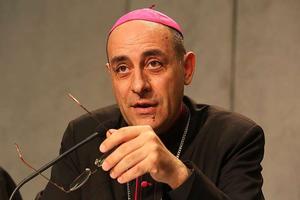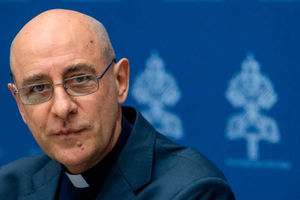Cardinal Fernández Says Pope Francis and the Vatican Were Aware of His Erotic ‘Mystical Passion’ Book
The prefect of the Dicastery for the Doctrine of the Faith said in a Spanish-language interview that he foresaw the criticism he would receive for the 26-year-old book.

VATICAN CITY — Cardinal Víctor Manuel Fernández has said that Pope Francis and the Vatican already knew about his sexually graphic 1998 book connecting sexual relations with a mystical relationship with God, and that he expected the work and other “old things” to be used against him.
In a new interview with the Spanish news agency EFE published Friday, the prefect of the Vatican’s Dicastery for the Doctrine of the Faith said he “foresaw” his critics bringing to light his book The Mystical Passion: Spirituality and Sensuality, which was withdrawn from sale soon after it was published.
“I knew that, in the midst of polemical issues, they could use old things like this book; they were just waiting for the right occasion,” he said. “I had informed the Pope that this could happen when he proposed to me this position [of DDF prefect] for the second time, but this was already clear to him and he also knew about this book.”
The work, which received widespread opprobrium after it resurfaced on a traditional Catholic Argentinian blog called “Caminante Wanderer” on Monday, includes a detailed depiction of an imaginary erotic encounter with Jesus Christ on the shores of Galilee, which Cardinal Fernández said was based on a spiritual experience disclosed to him by a 16-year-old girl.
“If I, or any priest, were to have written anything like this, we would likely be removed from ministry and sent away for evaluation, and rightly so,” Msgr. Charles Pope, pastor at Holy Comforter-St. Cyprian parish in Washington, D.C., told the Register Jan. 8. “For priests or religious to discuss such matters violates proper discretion and boundaries; it is wholly inappropriate and understandably shocks the faithful.”
EWTN commentator Father Gerald Murray told the Register it was the work of “a troubled priest” who has an “unseemly fascination with the specific details of sexual relations” and who promotes a “false and degraded spirituality that is sickening.”
Cardinal Fernández admitted to EFE that he had once been “denounced” for the book “many years ago,” but added, “I was not sanctioned in Rome for it. I have already been investigated up to my eyes.”
In comments earlier this week to Crux, the cardinal said his 26-year-old work “could be misinterpreted,” and so he did not think it would be “a good thing to spread it now” and that it is “contrary to my will.”
In his interview with the Spanish news outlet, Cardinal Fernández sought to defend the book, saying it is “remarkable because it is the result of research on the male and female orgasm that I had done with a group of married couples.”
“But something similar was done by two people greater and wiser than me: St. John Paul II and the holy abbess and doctor of the Church Hildegard of Bingen,” he said.
He said he quoted part of the conclusions of St. Hildegard’s research in his own book “because it is important to read it exactly: ‘When the sexual impulse makes itself felt in a man, something begins to turn inside him like a mill. [...] But in a woman, pleasure is like the sun, which gently, lightly and continuously bathes the earth with its warmth ...’”
Three years before writing The Mystical Passion, the then-Father Fernández had written another book that raised eyebrows, Heal Me With Your Mouth: The Art of Kissing, which was directed at teenagers.
Such writings were clearly of concern to the Vatican. The Register confirmed in July that, during Benedict XVI’s pontificate, the dicastery Cardinal Fernández now heads had a file of theological concerns about his works. Those concerns, which emerged around 2010 after a Vatican investigation, led to delays to the Vatican formally approving Cardinal Fernández’s appointment as rector of the Pontifical Catholic University of Argentina — delays that frustrated Cardinal Jorge Bergoglio, who had appointed him. Rome, however, relented and eventually formally approved the appointment.
A prolific author, Cardinal Fernandez has been one of the most influential figures of this pontificate. He first played a key role in helping the then-Cardinal Jorge Bergoglio draft the final document at the 2007 Aparecida conference. The document provided the background for many of Francis’ major writings over the past 11 years, and led to Cardinal Fernández drafting Pope Francis’ first major text, Evangelii Gaudium (The Joy of the Gospel).
He was also heavily involved in the 2014 and 2015 Synods on the Family and later was the ghost writer of Amoris Laetitia (The Joy of Love), the Pope’s 2016 controversial apostolic exhortation on those synods. The Argentinian priest, whom Francis elevated to archbishop soon after his election in 2013, also helped draft the Pope’s 2015 environmental encyclical, Laudato Si (Care for Our Common Home).
















